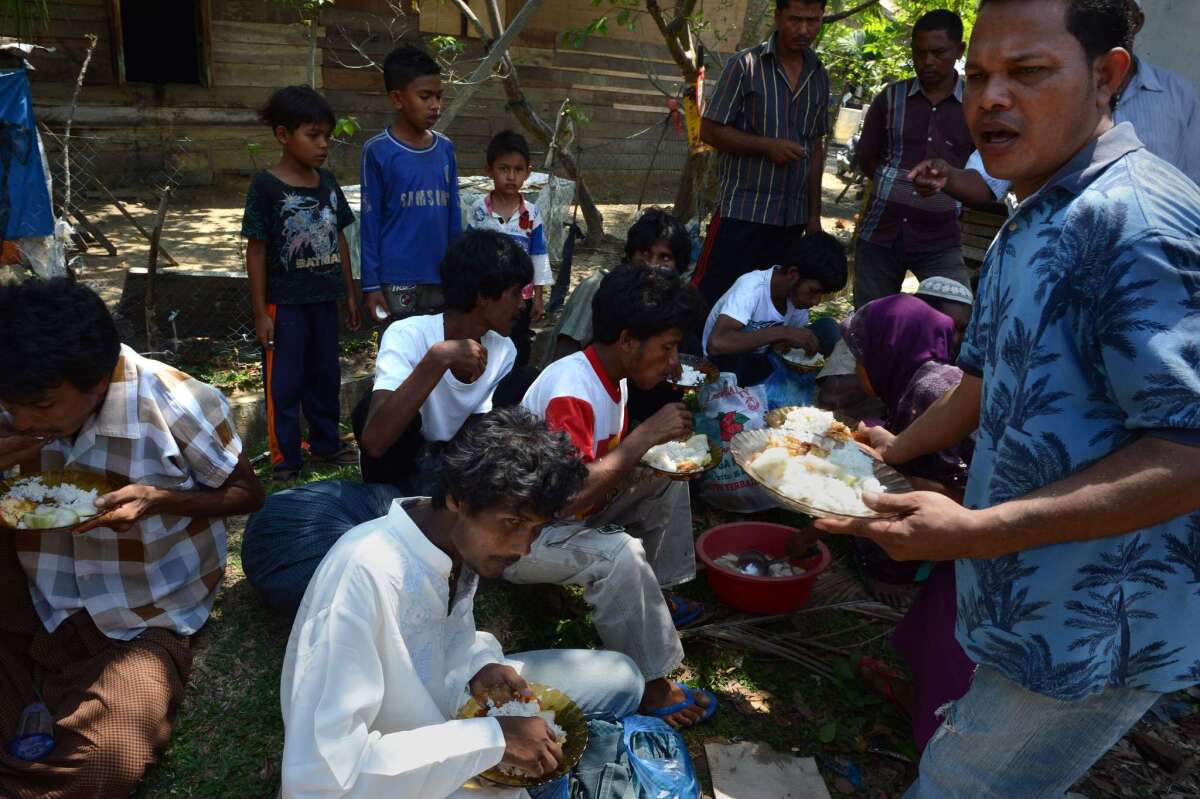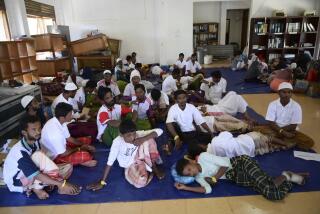Indonesia, Malaysia to take in migrants stranded at sea, reversing stance

Indonesian residents hand food to a group of Rohingya men from Myanmar in the compound of a mosque in Aceh province on May 20.
- Share via
Reporting from Bangkok, Thailand — The governments of Indonesia and Malaysia on Wednesday agreed to allow thousands of migrants stranded at sea to temporarily come ashore, taking what the United Nations has called an “important initial step” toward easing a grave humanitarian crisis that has engulfed the region for weeks.
The announcement, which followed a meeting of Thai, Indonesian and Malaysian officials, marked a sudden policy shift under intense international pressure. The three countries have repeatedly turned away scores of rickety fishing boats packed with as many as 8,000 refugees from Myanmar and job-seekers from Bangladesh, despite U.N. warnings that the lack of food and water on board would create an epidemic of “floating coffins.”
Foreign ministers of the three nations, meeting in Kuala Lumpur, Malaysia, said in a statement “that necessary measures have been taken by the three countries on humanitarian grounds” to address “the current influx of irregular migrants.”
Neither Bangladesh nor Myanmar, considered by many foreign observers to have played a major part in precipitating the crisis, participated in the talks. Thailand has offered to provide humanitarian assistance to the migrants, but not take them in, citing domestic concerns.
More than 3,000 migrants have reached land in Southeast Asia in recent weeks, about half of them in Indonesia’s Aceh province. Some drifted ashore; others were rescued by fishermen. Many have spoken of abysmal conditions on board; some say smugglers beat and tortured them, then fled off the coast of Thailand, leaving them adrift for days without food or water. Many migrants died of starvation, disease and, in some cases, fighting over scraps of food as their hope for survival dimmed.
Late Tuesday and early Wednesday, Indonesian fishermen rescued about 370 migrants from a sinking boat, government officials said. “They were suffering dehydration. They are weak and starving,” Khairul Nove, head of the Langsa Search and Rescue Agency in Aceh, told the Associated Press.
Thailand, Malaysia and Indonesia called on the international community to provide financial assistance to help shelter and care for the migrants and to return them to their country of origin or resettle them in a third country within one year.
“What we have clearly stated is that we will take in only those people in the high sea,” Malaysian Foreign Minister Anifah Aman said after the meeting, according to the Reuters news agency. “But under no circumstances would we be expected to take each one of them if there is an influx of others.”
International organizations have met the announcement with cautious praise. The U.N. refugee agency said that it was an “important initial step in the search for solutions to this issue” and that aid must be given to the migrants “without delay.”
“We commend the governments of Malaysia and Indonesia, in particular, for committing to continue to provide humanitarian assistance to the some 7,000 irregular migrants still at sea,” William Lacy Swing, director general of the United Nations’ International Organization for Migration, said in Geneva.
Most of the rescued Bangladeshis may soon be sent home. The U.N. said Wednesday that it would repatriate 2,000 to 3,000 who are believed to be detained in Thailand, Malaysia and Indonesia for illegally migrating there.
The migration organization had set up a $1-million emergency fund to resettle the detainees, said Asif Munir, a spokesman in Dhaka, the Bangladeshi capital. “This is one of the recognized ways to bring back illegal migrants from the landing country to their motherland,” Munir said.
Yet the future of the Rohingya refugees, who are fleeing persecution and systemic ethnic and religious violence in Myanmar, remains unclear. Officials with the U.N. refugee agency said they would attempt to interview the Rohingya migrants after they came ashore to determine whether they should be granted asylum.
Despite Malaysia’s and Indonesia’s statements that they would shelter the migrants for up to one year, international law forbids them from returning asylum-seekers with a legitimate fear of persecution.
“That obligation is very clear,” said Babar Baloch, a spokesman for the U.N. agency in Geneva. “With asylum-seekers there can be no time limit. The states have the obligation to give that protection.”
Bangladeshi Foreign Ministry officials said their nation would not take in the Rohingya, although there are 500,000 refugees there. The government of Gambia, a tiny, predominantly Muslim nation in West Africa, has offered to resettle them permanently, according to the Associated Press. The Philippine government said Tuesday that it would be willing to shelter Rohingya who were seeking asylum.
The Thai government is planning a conference of Southeast Asian nations on May 29 to discuss the issue. Thailand’s deputy foreign minister said Wednesday that Myanmar, which had said it would not participate, had accepted an invitation to the meeting, the Associated Press reported.
Bangladesh had faced intense criticism at home for failing to rescue its citizens who were stranded at sea; the Myanmar government, which does not recognize the Rohingya as citizens, has refused to accept responsibility for the problem.
Kaiman reported from Bangkok and Bengali from Mumbai, India. Special correspondent Mohiuddin Kader in Dhaka, Bangladesh, contributed to this report.
Times staff writers Kaiman reported from Bangkok and Bengali from Mumbai, India. Special correspondent Mohiuddin Kader in Dhaka contributed to this report.
For more news from South Asia, follow @SBengali on Twitter
More to Read
Sign up for Essential California
The most important California stories and recommendations in your inbox every morning.
You may occasionally receive promotional content from the Los Angeles Times.














